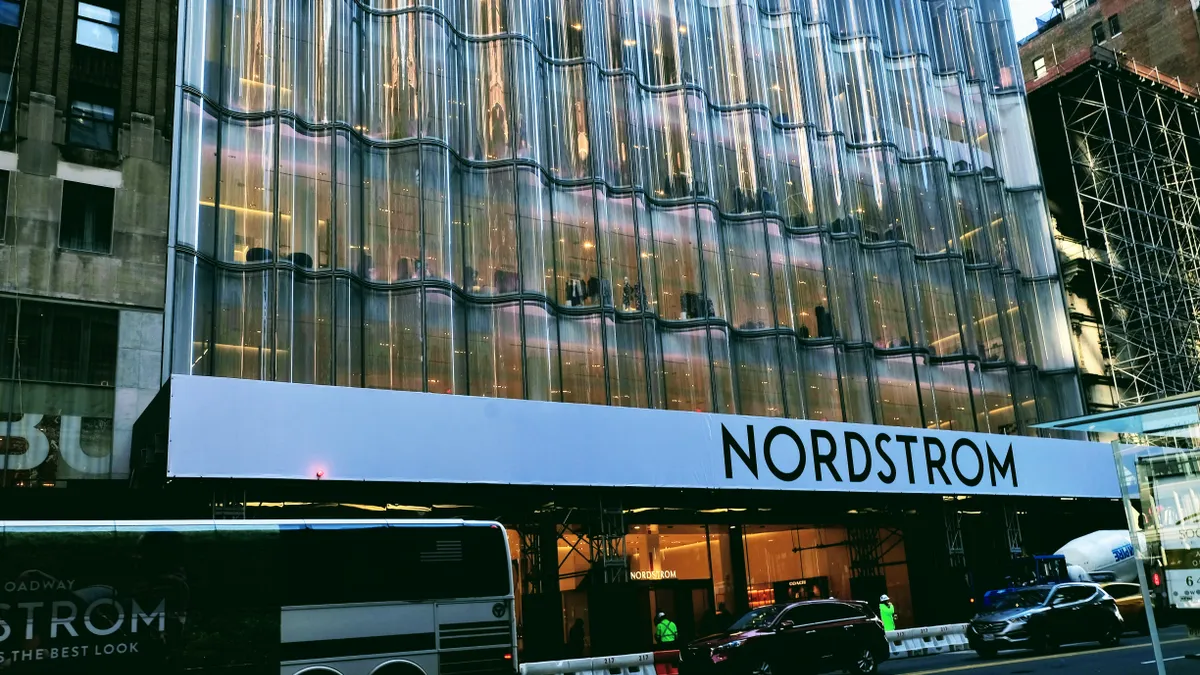Dive Brief:
-
In a filing to the Securities and Exchange Commission Wednesday, Nordstrom emphasized what are often somewhat boilerplate warnings about challenges to its business, saying that the COVID-19 pandemic may "have the effect of heightening many of the other risks described in this 'Risk Factors' section."
-
That includes risks "relating to our high level of indebtedness, our need to generate sufficient cash flows to service our indebtedness, and our ability to comply with the covenants contained in the agreements that govern our indebtedness." The retailer went so far as to say that its "financial situation could become distressed" if it's forced to keep stores closed for very long, and if the economy takes a turn for the worse in the longer term.
-
On Thursday Fitch, citing the same "significant business interruption from the coronavirus pandemic and the implications of a downturn in discretionary spending" found in Nordstrom's filing, downgraded the retailer's long-term issuer default rating and senior unsecured notes to 'BBB-' from 'BBB.' The agency also downgraded its short-term IDR and CP ratings to 'F3' from 'F2', and its rating outlook to negative. The ratings agency assigned a 'BBB' rating to Nordstrom's new $600 million 8.75% senior secured first-lien notes due 2025 and is affirming the 'BBB' rating on its senior credit facility, according to an emailed press release.
Dive Insight:
The department store sector, already in turmoil as consumers acquire less apparel and turn elsewhere when they do buy it, is especially hard hit by the consequences of the COVID-19 pandemic.
The outbreak, which has forced store closures and undermined e-commerce, also threatens longer-lasting trouble for the economy, which would impede discretionary spending further, even if stores are open.
Nordstrom is not the worst off. Neiman Marcus, for example, may be mulling bankruptcy, and top leadership at Macy's have departed at a time when executives were supposed to be executing a turnaround that had already entailed layoffs and store closures before the outbreak hit.
Nordstrom does have its own vulnerabilities, though. William Blair analysts Dylan Carden and Phillip Blee in emailed comments Thursday said that recent weak performance at off-price Rack gives them "less faith in the banner into another period of consumer duress." And throughout the last recession, Nordstrom's full-line stores had comp declines in the mid- to high-teens, indicating that "Nordstrom could see a slower recovery into summer as consumers start returning to stores, particularly with any prolonged recession," they also said. Even its strength in e-commerce could be undermined because those tend to be full-price, which would also suffer in a downturn.
Still, they do see hope for recovery, if a slow one, thanks in part to Nordstrom's already planned belt tightening.
"[W]e believe Nordstrom will be able to recapture a large portion of the margin it will lose in the current year given its lasting cost initiatives, while pulling back on capital expenditures, suggesting a potentially compelling free cash flow profile in 2021," Carden wrote, adding that a lot depends on if, when and how many stores can open in the summer.
















